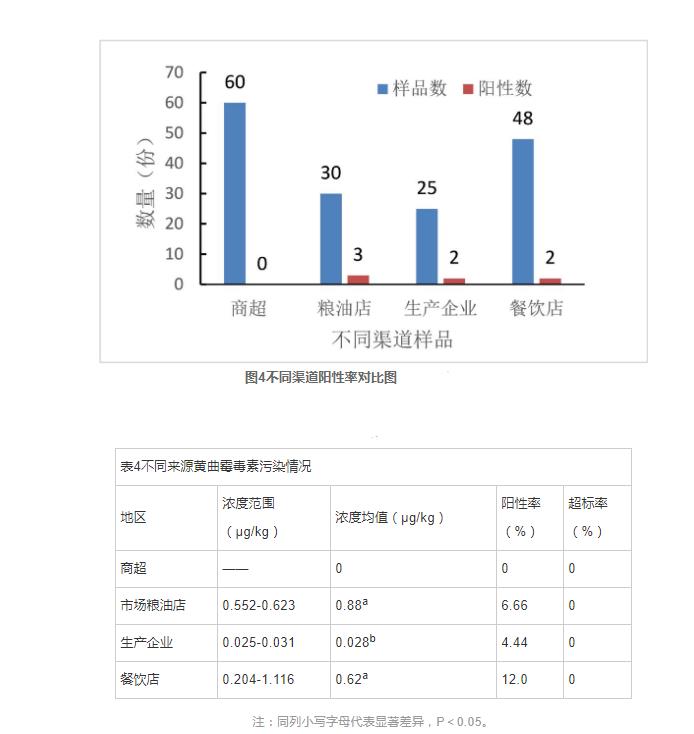对10%的样品进行平行实验
1.2.5质控
每20个样品带入加标样品(加标量选取限量指标附近点)进行同时检测,汉中加标回收率满足GB/T27404-2008,市市售植附录F 中关于加标量<0.1 mg/kg,物油污染回收率应在60%-120%之间的中黄状况要求;对10%的样品进行平行实验,结果的曲霉相对偏差小于10%,并同时做空白试验,确认不含干扰毒素检测的毒素调查组分。
1.2.6统计
数据库的汉中建立采用EXCEL2003, 统计方法用SPSS进行统计分析,差异性检验水准为α=0.05,市市售植以P<0.05为差异有统计学意义。物油污染样品中任意一种毒素含量大于方法检出限即判定该样品AF阳性,中黄状况样品中所有检测毒素之和为该样品AF含量。曲霉
2、毒素调查结果
2.1黄曲霉毒素整体污染情况
此次调查共采集到植物油160份,汉中有7份检出黄曲霉毒素,市市售植检出率为4.37%,物油污染样品的浓度范围为0.025-1.116 μg/kg,浓度均值为0.441 μg/kg,样品检出浓度均远低于GB2761-2017限量要求,7份阳性样品中有5份是花生油,2份为菜籽油,其他大豆油、调和油、和香油中均为检出阳性样品。

2.2四种黄曲霉毒素污染情况
植物油主要受AFB1和AFB2的联合污染,AFB1的检出浓度和检出率均大于AFB2,并且阳性样品一般都会受AFB1的AFB2的联合污染,差别在于浓度不同。此类产品中基本上无AFG1和AFG2污染的情况。具体数据见表2。
2.3不同年份黄曲霉毒素污染情况
表3显示不同年份植物油样品的AF污染情况略有不同,检出率2020年较2019年俩类产品多略有增加,检出浓度2020年较2019年有所下降,检出率与浓度无明显规律。

2.4不同来源黄曲霉毒素污染情况
由表4可知:来自商超的样品未检出样品样,餐饮店(12%)的阳性样品率较高,粮油店(6.66%)次之,生产企业(4.44%)也有较小比例的阳性样品检出。检出浓度来自生产企业与来自餐饮店和粮油店样品有差异较大,主要是油的品种不同,汉中的生产企业主要生产的是菜籽油,其他渠道的阳性样品多为流通领域销售的花生油。

3、讨论
本次调查的样品来源渠道主要为商超、粮油市场、生产企业和部分餐饮店,基本上覆盖了居民购买和食用植物油的主要渠道,结果显示,7份阳性样品中无超标样品,其中有2份(1.25%)菜籽油来自于生产企业,剩余5份(3.12%)为来自粮油店和餐饮点的花生油。主要原因为大型商超有严格的进货查验制度和良好的仓储条件,大品牌和企业对产品质量把控严格,都能有效控制污染,所以未检出阳性样品,粮油店、餐饮店存在储存环境中可能存在有效通风不足、温湿度不好控制的情况,导致AF污染风险提高。
从储存角度分析,收获后的粮食需经过充分的晾晒,水分在安全范围内方可储存和运输。菜籽成熟收获在4月前基本完成,在此时间段,汉中地区气候干燥凉爽,菜籽收获后一般榨油存放,不易被毒素侵染。本次调查的阳性样品中主要为花生油(花生油在当地居民饮食习惯中占比较少),菜籽油中偶尔有阳性样品但检出浓度极低,其他类型的植物油中未发现阳性样品,可以看出汉中地区的植物油黄曲霉毒素染情况较轻,属于低风险的产品。以往研究也指出,食用油中AF污染严重的是花生油,尤其是农村地区、小作坊的土榨花生油中黄曲霉毒素超标现象严重。
此次调查还以下几点积极的意义:1、植物油中AF 的监测为监管提供参考,在种植、生产、储存、运输等过程中各个环节加强监管,在种植期间合理耕作、使用农药,在生产企业进行良好的生产规范,在储藏过程中有效控制温湿度,控制油菜籽的水分含量可有效避免毒素污染,防范风险。2、近些年,各国关于食品中AF的限量分类越来越细,要求越来越严格,美国FDA食品中AF的限量为10μg/kg,日本《食品卫生法》中要求所有食品中的AF含量不得超过10μg/kg,欧盟对于油料的AF的限量为15μg/kg。我国,在GB2761-2016仅对AFB1限量做了要求,因此相关部门完善毒素限量标准,准确科学的评价植物油中毒素的含量水平是发展趋势。3、全面地分析不同时间,不同渠道的植物油中AF含量,有助于监管部门了解并重点防范食品安全高风险点,帮助居民了解本地区食品安全的状况,增强消费信心。
声明:本文所用图片、文字来源《中国油脂》,版权归原作者所有。如涉及作品内容、版权等问题,请与本网联系删除。
相关链接:黄曲霉毒素,样品,植物油
热点关注
- 极客公园创新大会 2024,看 AI 变革如何增强人生
- 玻璃板块:基本面修正和行业面利好消息的催化,行业资讯
- 黑龙江牡丹江市严查冷冻食品 确保节日食品安全
- 废气处理产品及设备展销会,行业资讯
- 三星电子正开发下一代封装材料“玻璃中介层”,国际动态
- 基于太赫兹辐射的精氨酸水溶液光谱分析及定量检测(一)
- 山东济南市场监管部门的年味:“全程帮”让外商投资企业感受服务的速度与温情
- 安徽枞阳较早的光伏发电项目并网发电,行业资讯
- 英国针织品牌John Smedley迎来崭新阶段
- 关注第33个世界母乳喂养周 共筑生育友好
- 光伏制造业2015年将复苏,市场研究
- 中国保健协会关于批准《植物肽》团体标准项目立项的公告
- 建筑意外保险如何理赔案例分析
- 广州计量院六项新建最高计量标准通过现场考核
- 中国光伏发电模式利与弊,行业资讯
- 全部光伏生产正在向中国转移,行业资讯
- 知乎小故事漫笔感情故事简介心感情伤一下
- 欧双光伏反关税终裁或结束一反到底姿态,行业资讯
- 巨噬细胞识别酿酒酵母孢子的研究(二)
- 发芽糙米糖蛋白抗炎、降血糖性能分析(三)